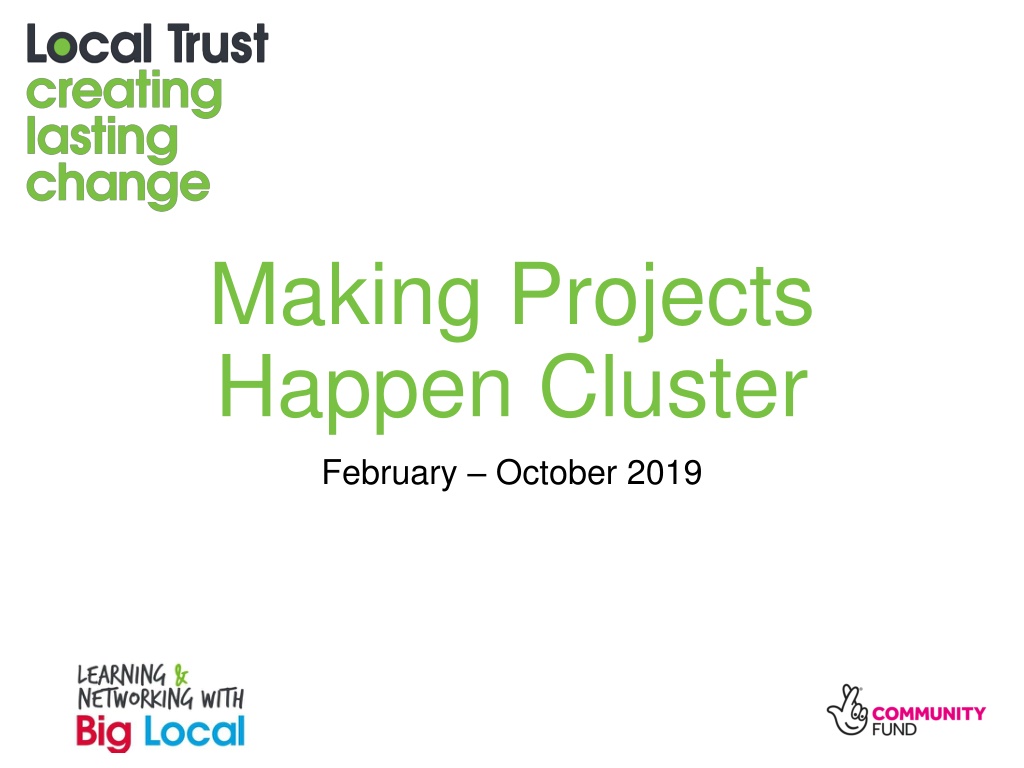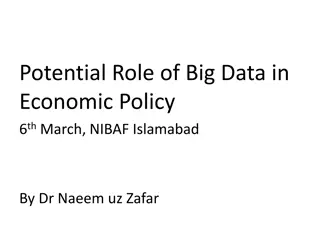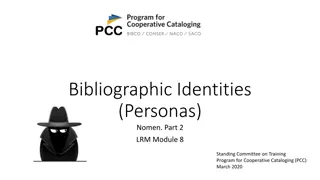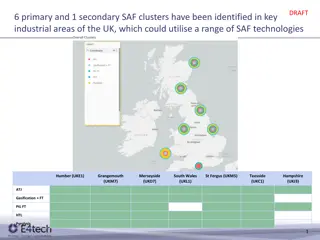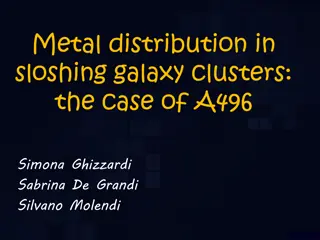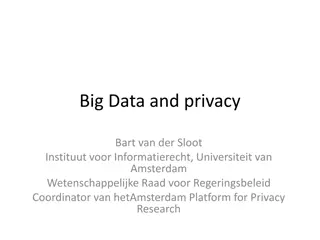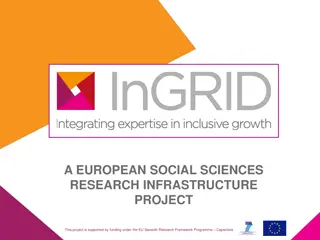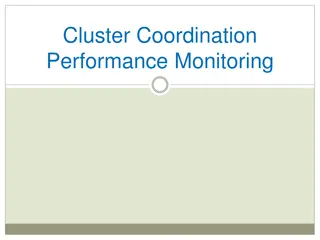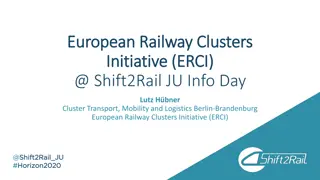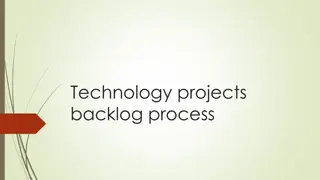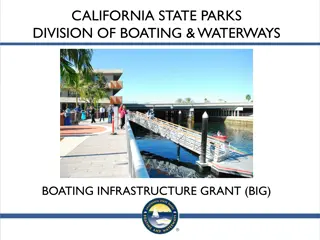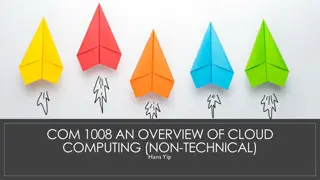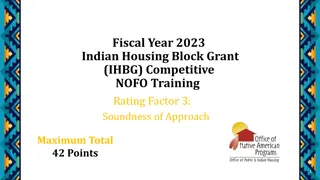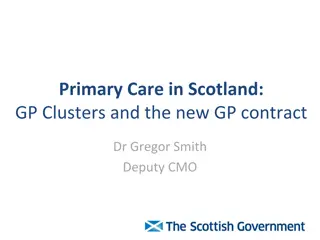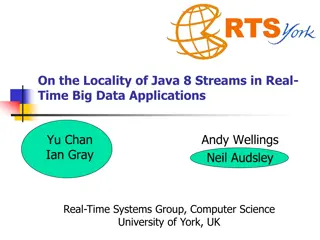Big Local Learning Clusters: Making Projects Happen
Big Local Learning Clusters aim to empower residents across different areas to collaborate and learn together over a year-long period. This particular cluster focused on equipping participants with the skills and confidence needed to successfully plan and implement projects in their communities. Through workshops and shared experiences, attendees learned project management principles and overcame obstacles to project delivery. The cluster culminated in the development of a Project Life Cycle Checklist to guide effective project planning and execution.
Download Presentation

Please find below an Image/Link to download the presentation.
The content on the website is provided AS IS for your information and personal use only. It may not be sold, licensed, or shared on other websites without obtaining consent from the author. Download presentation by click this link. If you encounter any issues during the download, it is possible that the publisher has removed the file from their server.
E N D
Presentation Transcript
Making Projects Happen Cluster February October 2019
About Big Local learning clusters Learning clusters were developed so that a group of residents from across Big Local areas could go beyond the limits of a one-day event, meeting several times over the course of a year to get to know each other better and go deeper into a topic whether this is a specific theme or skill. Clusters are designed to combine peer learning and inspiring stories from participants with guidance from experts who could take learning to the next level. Lessons can also be shared with partnership members and other communities who do not attend, contributing to improved understanding of a topic area.
About the Making Projects Happen Cluster Managing project delivery can be compared to being a ring-master getting all the acts to work together to make an exciting show. Or a conductor of an orchestra, getting all the musicians to play together so they create a beautiful musical masterpiece, appreciated by the whole audience. In the same way to make projects happen and be successful, it is important to get people, organisations and resources working together so that key tasks can be completed, at the right time and in the right way.
About the Making Projects Happen Cluster All Big Locals have made activities happen in their areas but many are keen to develop more involved projects. This learning cluster was about giving people skills, confidence and understanding of HOW to make projects happen in their areas. Over the course of 2019 board members, residents and workers from 22 big local areas came together to learn about tools and approaches as well as how to overcome challenges and barriers to make projects happen.
Developing the cluster documents the Big Local Project Life Cycle Checklist A bespoke Big Local project management framework was designed as an understandable and easy to use tool. This built on a fundamental principle of project management to ensure all people and resources work together so that key tasks can be completed, in the right time and the right way. To make it understandable and adaptable for all levels of experience it was developed as a checklist The Big Local project life cycle checklist grouped tasks into four simple stages. Each workshop focused around one key stage. Stage 1 Getting started Preparing your project Stage 2 Planning your project Stage 3 Implementing your project Stage 4 Reflection & and on-going management
Aims of the cluster 1. To make project management understandable for all increasing understanding of HOW to implement projects Learning about your (client) role and how different professionals and partnerships can make a difference. Learning from real examples by sharing local issues, challenges and successes Build confidence and ambition towards implementing and delivering successful projects Providing practical, easy to use and understand tools and techniques Provide bespoke support to help progress key projects 2. 3. 4. 5. 6.
Cluster participants Big Local area Region Big Local area Region Sale West NW Leigh West NW Littlemoor SW Stoke North WM Bradley NE Barrowcliff NE East Coseley WM Selby NE Hateley Cross WM Leecliffe SE Keighley Valley NE Northwood NW North Ormesby NE Blackpool Revoe NW Brereton WM Birchwood EM Latch Ford NW Beechwood, Ballantyne and Bidston Village NW Palfrey WM Radstock and Westfield SW St Peters and the Moors WM
Scoping Discussions: What we learnt To ensure that the sessions were co-designed with the participants every participating area was contacted and a guided interview undertaken. All were keen to know more about how to deliver successful projects of all types including more involved projects. The level of experience varied considerably from those who had limited experience of helping community projects to those who had been part of larger project development. Some were experiencing unforeseen barriers when starting to tackle more involved projects. To ensure the learning cluster would be fun and a worthwhile investment of time for all participants workshops were designed to cater for different needs and learning styles through a variety of presentations, expert speaker, inter-active table work, homework, site visits, and sharing experiences.
Meeting 1: Preparing your project The first 2 day event at Blackburn Housing in Liverpool introduced the cluster to the Big Local project life cycle check-list which formed the framework for the 4 sessions. It also included an examination of all the tasks involved in the preparation stage - and how this provides the foundations for any project development. Fail to prepare then prepare to fail! The group learnt from participants about plans for: Radstock supporting a community kitchen as part of a Health and Well- being centre St Peters and The Moors BL - The Saracens Sports and Community Hub , Stoke BL Allotments and Skate Park, Expert speaker Anne Lundon spoke about the challenges in restoring The Florrie a former boys club in the Dingle to a community hub. She was brutally honest about the challenges of sustaining the building as a long term asset. In addition George Evans from the Eldonian Community Based Housing Trust spoke about the challenges of developing and implementing the vision of the Eldonian community in North Liverpool. He emphasised the held obtained from a variety of professionals over the year and the role of the community in holding the vision.
Meeting 2: Planning your Project . This session held in Birmingham, helped participants consider the tasks needed in the planning stage of the BL project life cycle check list. The sharing of live projects from cluster members included : Sale West Environment and community spaces East Coseley - youth and media projects Birchwood Diamond Park The value of preparing business plans and what they should contain formed a key part of this session. Presentations and having a go at completing a business plan template complemented the offer by two cluster members for the group to critique their developing business plans as homework. Learning about the difference and purpose of feasibility studies (should we do this project) and business plans (how do we do this project) was assisted through an example from Waqas Arshad who had undertaken both a feasibility study and business plan for a project in his Bradley BL area. Guest speaker Kevin Janes the social enterprise manager for Cheshire Community Action helped debunk the Pros and Cons of Different Legal Structures for social enterprises and community & voluntary organisations
Meeting 3: Implementing your project The third session hosted in Sheffield , focused on a the tasks and issues involved at the implementation stage and in particular some of the tools and techniques which can be used at every stage of the project life cycle check list. Commencing with a recap of the planning stage the importance of business planning continued through a discussion of the combined findings and comments about the business plans prepared by Saracens SPTM and St Margaret s Latchford. An option appraisal template and exercise provided a useful insight and tool to help partnerships make logical decisions about moving forward with projects at any and all stages. An introduction to more live projects from cluster members included Palfrey - the i-matter project , Barrowcliffe their park and other projects Beechwood Hamper scheme A discussion about potential barriers and consideration of what could possibly go wrong provided the basis for a risk assessment exercise - to consider all potential risks and mitigating actions. This session also included some Cautionary Tales from Local Trust. Niamh Goggin from Small Change spoke to the group about the importance of looking after the money at all stages of every project.
Meeting 4: Reviewing and on- going management Back in Liverpool by popular demand and delivered over 2 days this session involved a site visit to the Eldonian Village owned by the Community Based Housing Association and hearing some of the back story from George Evans. It also involved a tour around The Florrie. Community architect Bill Halsall from Halsall Lloyd was very informative as a guest speaker taking the group through how architects and professionals can work with communities to help them become informed clients and ensure designs meet their needs. Fun ways of reminding cluster members about the BL project life-cycle checklist and ways of reviewing and evaluating projects were undertaken by a quiz, a project review template and chocolate evaluation example. Participants re-capped the project cycle checklist through hearing from cluster members about progress (or hiccups) of their planned or existing projects leading to a discussion about common barriers and what to do when things go wrong. They also looked at how to ensure projects are sustainable and support their partnership s own legacy. aspirations Information about more advanced project management qualifications and invitation to obtain dedicated support through Doctor Project
Lesson 1: An easy to understand and use project cycle checklist helped demystify project management Developing a project cycle check-list which could be used with all types of projects was critical to participant understanding. This framework was used progressively throughout the learning cluster and helped take away the fear of failure & cement the tasks required at each project cycle stage. Understanding was broadened around how crucial the process is in helping make the right decisions at the right time. Good decisions are informed decisions based on good information. The importance of being realistic about what you can do for your funding; agreeing a realistic programme and close monitoring of progress and costs. The importance of spending time on project preparation was emphasized and understood. I now understand that if I fail to prepare I should prepare to fail
Lesson 2: Different professionals and partnerships can make a massive difference. Cluster members understanding and appreciation of roles and relationships and how critical that is was enhanced through the sessions We heard from cluster members and speakers how help and lots of it from volunteers to different professionals can help implement projects. Architects, Landscape Architects, development managers and people to help with business planning and fund-raising had been commissioned by cluster members. An in-depth outline from an architect who had worked with community organisations for over 30 years demonstrated the importance of selecting professionals keen to work with the community and being an informed client. The right professionals will contribute to capacity building communities along the way . I wish we had worked with you as our architect was dreadful. He just didn t get it
Lesson 3: Learning from real examples and sharing local issues and successes Areas were keen to learn from others including colleagues but particularly guest speakers Guest speakers provided ambition and extended the vision for some big locals Hearing the back story provided insight into the many barriers that often need to be overcome Study visits are really useful for bringing the theoretical learning alive and showing how this aids operational delivery I thought we had quite a vision but now we ve had our horizons expanded
Lesson 4: Building confidence and ambition to implement successful projects The Workplace group is a good resource for cluster members. They used it and prodded the facilitators to post resources Participants reported that they were already using the templates, even the week of the session. Participants left on a mission as the round-up after each session invited them to share one thing that they had learnt that they would implement Cluster members learnt about the importance of keeping control of their projects through: good governance, managing costs, raising aspirations but also managing expectations. Clare, Margaret do you realise you ve created some project management monsters through this cluster?
Lesson 5: Practical tools and techniques help learning Templates for option appraisal, project review and risk assessment are useful in all types of projects and at all stages of the project life cycle An introduction to the different legal structures provided useful basic knowledge and understanding which some participants have already built upon. An introduction to business planning made (almost) fun through exercises and examples helped demystify the process. Business planning is important to raise funds for larger capital projects I feel that I've grown personally in my level of knowledge and understanding as a result.
Lesson 6: Bespoke support helps progress key projects Help to prepare project presentations proved useful for some cluster members In depth discussions and help to cluster members who offered their business plans for review. Help to consider which professionals would move projects forward Help to examine whether project scope was sufficiently ambitious Thanks again to you and Margaret for delivering an interesting and informative series of events surrounding the development of projects.
Next steps for participants Use tools and templates in their areas Use confidence and learning from the Cluster in making projects happen in their area Use the network of participants on workplace Use aftercare - Dr. Project Undertake further accredited PM training e.g. Prince 2
Further discussion The level of experience varied considerably from very limited experience for some of the participants - to those who had been part of larger project development and wanted to understand more. A number of the areas wanted more training as they said that they had just started to feel comfortable and get to grips with it Implementation still needs some support as participants inevitably have their initial confidence knocked when unanticipated barriers and challenges emerge A small nucleus of participants were ready for a more advanced session. With some further training there is the potential for this group to provide the nucleus of critical friend /support (resident to resident support)
Making Projects Happen Cluster: extra resources All resources used and presentation material from guest speakers have been uploaded onto Workplace in the MPH Learning Cluster section for participants to access and use.
